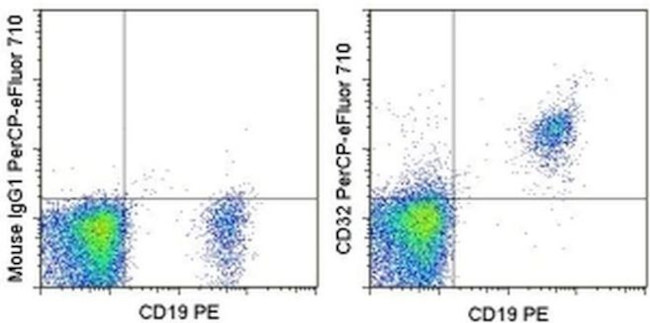Search Thermo Fisher Scientific
Invitrogen
CD32 Monoclonal Antibody (6C4 (CD32)), PerCP-eFluor™ 710, eBioscience™
FIGURE: 1 / 2
CD32 Antibody (46-0329-42) in Flow


Product Details
46-0329-42
Species Reactivity
Published species
Host/Isotype
Recommended Isotype Control
Class
Type
Clone
Conjugate
Excitation/Emission Max
Form
Concentration
Purification
Storage buffer
Contains
Storage conditions
Shipping conditions
RRID
Product Specific Information
Description: This 6C4 monoclonal antibody reacts with human CD32 (also known as Fc gammaRII). This antibody recognizes two isoforms of the receptor, Fc gammaRIIA and Fc gammaRIIB. These 40-kDa polymorphic transmembrane glycoproteins are expressed on B cells, granulocytes, monocytes, macrophages, and platelets. Moreover, these receptors are detected on natural killer cells. CD32 enables interaction between Fc gammaRII-expressing cells and opsonized antigen or IgG-containing immune complexes. Both receptors exhibit low affinity towards IgG and play a role in inflammation and autoimmune disease. This clone has been reported to inhibit Ig binding in a rosette blocking assay.
Applications Reported: This 6C4 (CD32) antibody has been reported for use in flow cytometric analysis.
Applications Tested: This 6C4 (CD32) antibody has been pre-titrated and tested by flow cytometric analysis of normal human peripheral blood cells. This can be used at 5 µL (0.5 µg) per test. A test is defined as the amount (µg) of antibody that will stain a cell sample in a final volume of 100 µL. Cell number should be determined empirically but can range from 10^5 to 10^8 cells/test.
PerCP-eFluor® 710 emits at 710 nm and is excited with the blue laser (488 nm); it can be used in place of PerCP-Cyanine5.5. We recommend using a 710/50 bandpass filter, however, the 695/40 bandpass filter is an acceptable alternative. Please make sure that your instrument is capable of detecting this fluorochrome.
Fixation: Samples can be stored in IC Fixation Buffer (Product # 00-822-49) (100 µL cell sample + 100 µL IC Fixation Buffer) or 1-step Fix/Lyse Solution (Product # 00-5333-54) for up to 3 days in the dark at 4°C with minimal impact on brightness and FRET efficiency/compensation. Some generalizations regarding fluorophore performance after fixation can be made, but clone specific performance should be determined empirically.
Excitation: 488 nm; Emission: 710 nm; Laser: Blue Laser.
Filtration: 0.2 µm post-manufacturing filtered.
Target Information
This gene encodes one member of a family of immunoglobulin Fc receptor genes found on the surface of many immune response cells. The protein encoded by this gene is a cell surface receptor found on phagocytic cells such as macrophages and neutrophils, and is involved in the process of phagocytosis and clearing of immune complexes. Alternative splicing results in multiple transcript variants.
For Research Use Only. Not for use in diagnostic procedures. Not for resale without express authorization.
How to use the Panel Builder
Watch the video to learn how to use the Invitrogen Flow Cytometry Panel Builder to build your next flow cytometry panel in 5 easy steps.
Bioinformatics
Protein Aliases: CD32; CD32 receptor 2; CD32 receptor 2a; CDw32; Fc fragment of IgG, low affinity II, receptor for (CD32); Fc fragment of IgG, low affinity IIa, receptor (CD32); Fc fragment of IgG, low affinity IIb, receptor (CD32); Fc fragment of IgG, low affinity IIb, receptor for (CD32); Fc fragment of IgG, low affinity IIc, receptor for (CD32); Fc gamma receptor IIa; Fc gamma receptor IIb; Fc gamma receptor IIC; Fc gamma RIIb; Fc-gamma RII-a; Fc-gamma RII-b; Fc-gamma RII-c; Fc-gamma-RIIa; Fc-gamma-RIIb; Fc-gamma-RIIc; fcRII-a; fcRII-b; FGFR2B; IgG Fc receptor II-a; IgG Fc receptor II-b; IgG Fc receptor II-c; Immunoglobulin G Fc receptor II; immunoglobulin G Fc receptor II-c; Low affinity immunoglobulin gamma Fc region receptor II-a; Low affinity immunoglobulin gamma Fc region receptor II-b; Low affinity immunoglobulin gamma Fc region receptor II-c; MGC23887; MGC30032; RP11-5K23.6
Gene Aliases: CD32; CD32A; CD32B; CD32C; CDW32; FCG2; FcGR; FCGR2; FCGR2A; FCGR2A1; FCGR2B; FCGR2C; FCRIIC; IGFR2
UniProt ID: (Human) P12318, (Human) P31994, (Human) P31995
Entrez Gene ID: (Human) 2212, (Human) 2213, (Human) 9103

Performance Guarantee
If an Invitrogen™ antibody doesn't perform as described on our website or datasheet,we'll replace the product at no cost to you, or provide you with a credit for a future purchase.*
Learn more
We're here to help
Get expert recommendations for common problems or connect directly with an on staff expert for technical assistance related to applications, equipment and general product use.
Contact tech support

